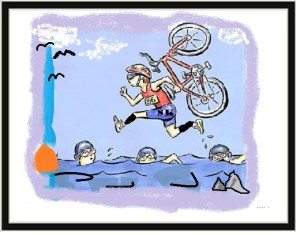Ilana Katz MS, RD, CSSD (a partner in crime)
Just the other day I was pleased to see a whole bunch of 5:00am-ers waiting for the gym doors to open. The regulars were there too, most of them with their eye roll to one another (translation: “these new folk will be gone before the next cold days emerges”).
According to Time.Com. the most broken resolutions are related to diet and exercise. So why then do people keep making the same resolutions and breaking them year after year? More importantly, what can we do to make this year different?
So how well did you fare?… as we are heading towards the end of January, the 5:00 am line at my gym has petered down to the regulars. I guess I am preaching to the choir (talking to dedicated athletes does have more of a curve shift) however, are your triathlon goals still in check?
With February being on the horizon, this may be the best time to reevaluate what your goals are. Maybe you set yourself up to fail with an unrealistic outcome. Losing 20lbs in a month doesn’t really seem reachable after reality sets in. It’s ok to modify your resolution and make a goal that is achievable.
Depending on your answers to above, it may be time to step up a new plan of attack. You do not have to wait for New Year to resolve.
Here are some triathlete specific examples:
- Partners in Crime
Get some help. Knowing that someone will be there with you results in a sense of accountability. Maintaining a healthy lifestyle can be difficult, especially if you have been racing and training hard for some time and have reached burnout. You can’t have a friend be at every training session or watch everything you eat but working with an expert can help with this solution. Studies from the American Psychology Association have shown that using partners enhance success. A coach can help with sticking to a plan, or a nutritionist can help make a realistic meal plan and most importantly help implement it.
- Race specifics
Have you been contemplating the challenge of taking on a longer distance or more challenging race?
Perhaps you have already accomplished sprints and Olympics but the 70.3 or full ironman seems too much to take on. Or even if you have completed the distances, a more challenging course or different destination looms on your mind. You will not check off that box until you commit, establish your goal, and implement.
Don’t forget, the more endurance you decide to take on, the more important sports nutrition and other supporting tools become. There is a whole new realm optimal race weight, eating for competing, and fuel and recovery as you head towards ultra-distances, therefore see #1 (partners in crime).
- Resolve on your performance hindrances
For every athlete, there are always areas that need improvement, Particularly with triathletes who tend to focus on swim, bike and run and neglect other areas such as
- Haphazard nutrition (of course I am biased about this one)
- Unnecessary body weight (yes, this one too)
- Rest and recovery (and yes, there is a nutrition spin in here too)
And then some training areas that can always use some extra resolutions:
- Core strength
- Flexibility
- The challenge of the hill/mountain
- Rest and recovery
- Random training (goes hand in hand with nutrition being haphazard)
- Limited knowledge
And then there is mileage. Perhaps putting in the necessary mileage week after week could be a great resolution, merely because we tend to get bored and cut workouts short. Determine the mileage necessary to hit each week and improve on the limiting factor.

- Resolve your performance challenges
Once you are a regular and comfortable triathlete, a great resolution could be to challenge performance levels. Some good examples are:
Hit certain PRs
Place in age group
Complete a run portion in a challenging minute per mile
Complete a bike portion with a higher than your typical average miles per hour
Be the first out of the water in age group
Aim for a Boston qualifier or a Kona place
- Deal with burn out
It may be the case where life over and above triathlon may have taken a backseat. Some may resolve merely to regroup on motivation, enjoyment, and inspiring others within the sport.
For many, a great resolution to consider would be to be relieved of the stress of competing and focus on the enjoyment of the training and thus completing without the competitive anxiety.
Some ideas here may involve connecting a race with a fund raiser and focus on raising money for a good cause. Or merely involve your family in a relay event.
Burnout may also be related to insufficiency of the right nutrients or over abundance of the wrong fuel sources. Work on meal planning (and again, see #1: Partners in crime).
Tips for success:
- Plan ahead
Every good triathlon plan includes set goals, objectives, training hours, race priorities, etc. Coaches and sports nutritionists are on board to help and they will insist the plan is set up in the early stages of training for a target race.
- Be SMART about your goals – Specific, Measurable, Achievable, Realistic, and T
For example:
A resolution of “lose weight” is not specific. A specific goal would look more like “hit my target weight before my first A race”.
A resolution of “have more fun” is indefinable. It may be better to state a stress-free environment, with a focus on social aspect of your tri club for example.
- Maintain Positivity
For example: “do not mess up swim to bike transition” phrase rather as Transition one in under 5 minutes
OR “do not get injured” should be stated as follow designed coaching and nutrition plan to avoid injury.
- If you want to accomplish a goal – share it!
The odds of success for any goal is if others know what you are aiming to accomplish. Not only is there a backup support system, but there is also the commitment and accountability once it is aired.
Happy February y’all…. Now get on it and get your partners in crime lined up!!






